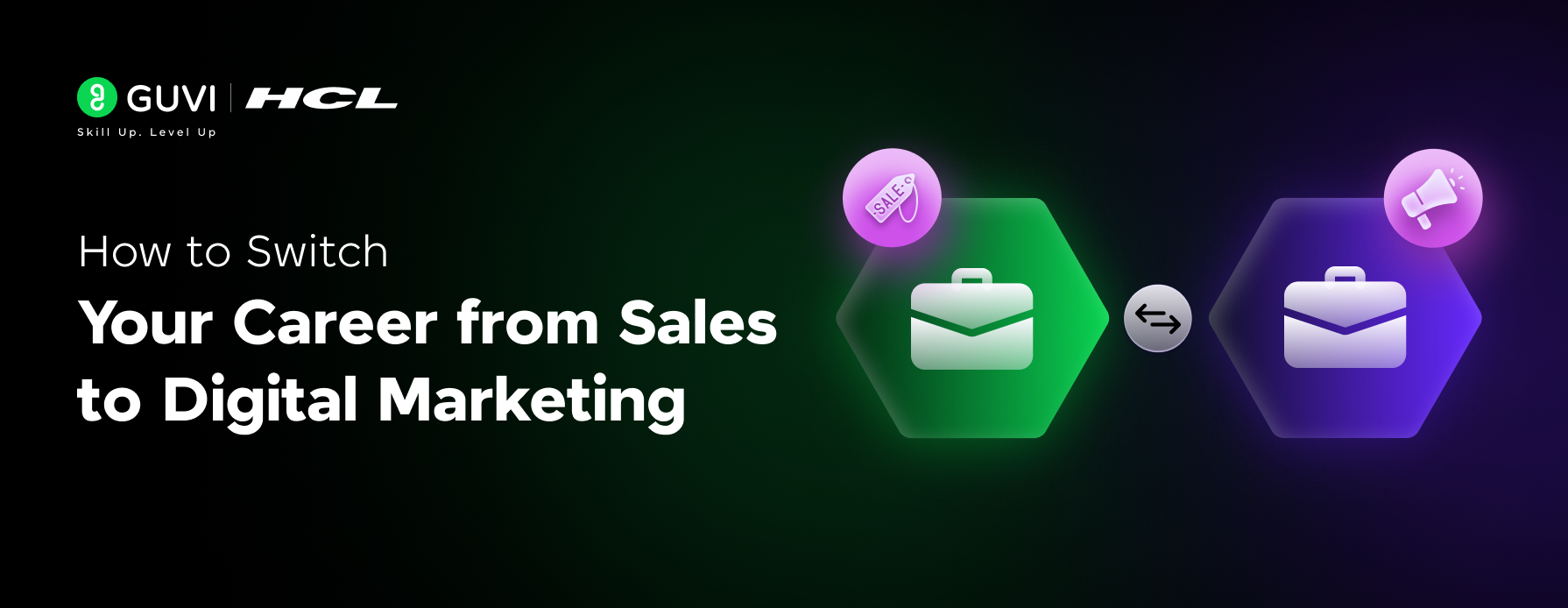
How to Transition from Sales to Digital Marketing
Mar 12, 2025 7 Min Read 1789 Views
(Last Updated)
Did you know that 71% of companies are increasing their digital marketing budgets in 2025? Traditional sales roles continue to become automated. Your sales background has given you valuable skills. The timing couldn’t be better to switch from sales to digital marketing. Modern marketing teams need your existing skills – from relationship building to understanding customer psychology.
Digital marketing opens exciting opportunities whether you want to change careers or grow your professional toolkit. The field blends creativity with evidence-based decisions. Sales professionals who understand customer behavior and enjoy measurable results will find this career path rewarding.
This article depicts the exact steps to make your transition from sales to digital marketing smooth and successful. We’ll cover everything from core skills and certifications to practical strategies that help you break into the industry. Let’s begin!
Table of contents
- Switching from Sales to Digital Marketing: Your Step-by-step Guide
- Step 1) Understanding the Digital Marketing Landscape
- Step 2) Understanding why Digital Marketing is the Natural Next Step for Sales Professionals
- Step 3) Essential Digital Marketing Skills to Develop
- Step 4) Building Your Digital Marketing Foundation
- Step 5) Leveraging Your Sales Experience
- Step 6) Creating Your Transition Strategy
- Concluding Thoughts…
- FAQs
- Q1. Is it possible to transition from sales to digital marketing at age 35?
- Q2. What are the key digital marketing skills I should develop when transitioning from sales?
- Q3. How can I leverage my sales experience in a digital marketing career?
- Q4. What are some good ways to gain practical digital marketing experience when switching careers?
- Q5. How long does it typically take to transition from sales to a digital marketing role?
Switching from Sales to Digital Marketing: Your Step-by-step Guide
Switching from sales to digital marketing can be a powerful step toward personal and professional fulfillment. With sales work experience, you bring transferable skills like problem-solving, adaptability, and communication, which are highly valued in digital marketing. To make the transition easier for you, let’s break it down step-by-step.
Step 1) Understanding the Digital Marketing Landscape
Digital marketing needs a solid understanding of the modern digital world before you make the switch from sales. Here’s a breakdown of what you’ll find in your new career path.
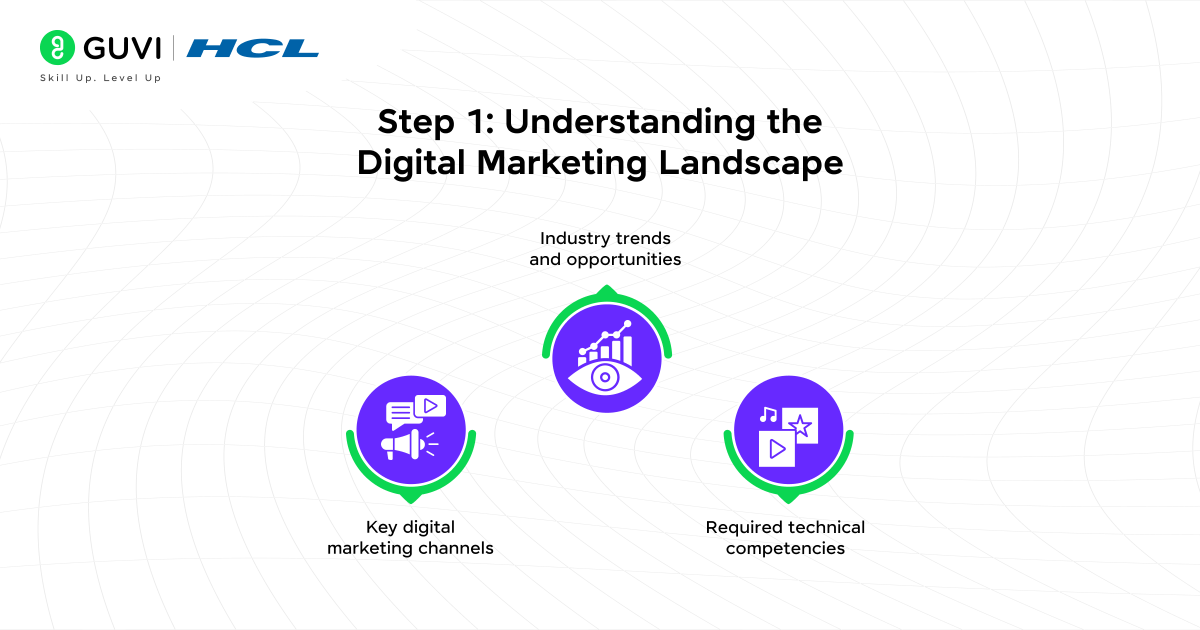
1.1) Key digital marketing channels
Digital marketing channels help businesses promote their products and services online. Your new marketing role will involve working with these core channels:
Website Marketing:
A website serves as the digital storefront of your business, providing a centralized platform to showcase products, services, and values while building trust and credibility. Tools like WordPress, Squarespace, or Shopify simplify website creation and management. Techniques such as responsive design, clear navigation, and engaging content enhance user experience. Integrating analytics tools like Google Analytics helps track visitor behavior and optimize strategies to convert leads into customers.
Search Engine Optimization (SEO):
SEO focuses on improving a website’s visibility in search engine results to drive organic traffic. Techniques include keyword research using tools like SEMrush or Ahrefs, on-page optimization (improving titles, meta descriptions, and content structure), and off-page strategies like backlink building. Implementing technical SEO ensures your site is mobile-friendly, loads quickly, and uses proper schema markup. These efforts increase rankings, making your business more discoverable.
Content Marketing:
Content marketing involves creating and sharing valuable, relevant, and consistent content to attract and retain an audience. Formats include blogs, videos, infographics, and podcasts. Tools like Canva (for visuals), Grammarly (for writing), and BuzzSumo (for trending topics) support content creation. Distribution strategies leverage social media, websites, and email campaigns. High-quality content establishes thought leadership, improves engagement, and complements SEO.
Social Media Marketing:
Social media platforms like Facebook, Instagram, and LinkedIn offer opportunities to connect with target audiences through engaging posts, stories, and ads. Tools such as Hootsuite or Buffer help manage multiple platforms and schedule posts. Techniques include creating shareable content, running contests, and leveraging hashtags for discoverability. Paid campaigns and analytics provided by platforms ensure targeted outreach and performance tracking.
Email Marketing:
Email marketing involves direct communication with audiences through personalized and automated messages. Platforms like Mailchimp, Constant Contact, or HubSpot help design, segment, and track email campaigns. Techniques include welcome series, promotional emails, and newsletters. Personalization using CRM data increases open and click-through rates, making email marketing a cost-effective way to nurture leads and drive conversions.
Paid Advertising:
Paid advertising places your brand in front of potential customers through platforms like Google Ads, Facebook Ads, and LinkedIn Ads. Strategies include pay-per-click (PPC) campaigns, display ads, and retargeting. Tools like Google Keyword Planner and AdEspresso assist in campaign planning and management. Targeting specific demographics ensures your ads reach the right audience, driving traffic and maximizing ROI.
1.2) Industry trends and opportunities
The digital world has radical alterations that create perfect opportunities for your transition. Today, 87% of consumers start their buying trip online. This makes digital marketing vital for businesses. The industry shows rapid growth in several areas.
AI and automation have become essential tools. About 64% of marketers now use AI technology. Your sales experience with customer behavior will add value as marketing becomes more informed and individual-specific.
1.3) Required technical competencies
Digital marketing success depends on specific technical skills. Data analysis forms the core, and marketers use various tools to track and measure campaign performance. You need proficiency in:
- Analytics and Data Tools: Learning to collect, interpret, and utilize marketing data. This includes working with platforms like Google Analytics and social media insights.
- Content Management Systems: Knowledge of platforms to create and manage digital content. Your sales experience in communication helps you create compelling content across these systems.
- Marketing Automation: Familiarity with tools that optimize marketing processes and campaign management. About 81% of marketers say that marketing automation improves their campaign performance.
Step 2) Understanding why Digital Marketing is the Natural Next Step for Sales Professionals
Your move from sales to digital marketing builds on your existing expertise and makes perfect sense as a career choice. Sales experience creates a strong foundation to succeed in the digital world.
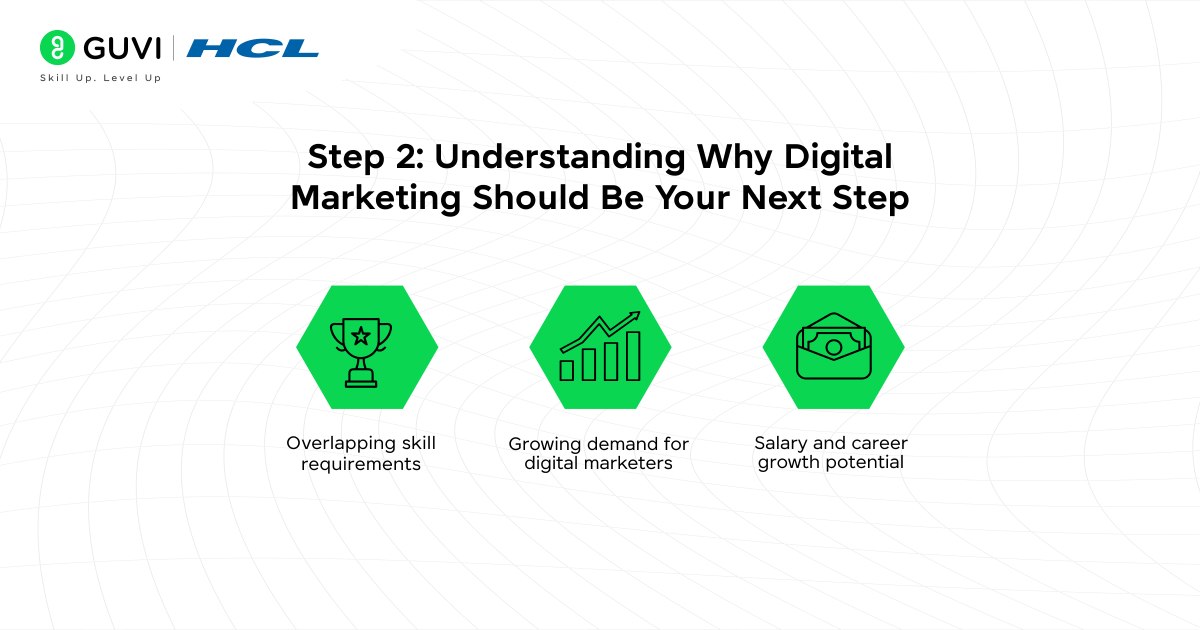
2.1) Overlapping skill requirements
You already have many skills that digital marketers need from your sales background. Modern marketing needs customer-focused abilities that line up with your sales toolkit:
- Customer Journey Understanding
- Data-Driven Decision Making
- Strategic Communication
- Problem-Solving Abilities
- Goal-Oriented Mindset
2.2) Growing demand for digital marketers
Digital marketing offers plenty of opportunities as the field keeps expanding. The industry will grow by 10% from 2021 to 2031, which is a big deal as it means that it’s growing faster than other sectors. Companies are moving their focus to digital channels rapidly.
Digital marketing jobs rank among the top 100 nationwide, and over 34,000 job openings will appear each year in the next decade. Organizations in every sector – from healthcare to manufacturing – need professionals who can create compelling digital campaigns.
2.3) Salary and career growth potential
You get higher salary compensations when you switch to digital marketing. New digital marketers start at ₹3–4.5 LPA (lakhs per annum), and your salary grows as you gain experience. You can earn around ₹8–12 LPA after 5-6 years in the field.
Leadership roles pay even better if that’s your goal. Marketing Directors can earn up to ₹25–35 LPA, and Creative Directors make around ₹18–30 LPA. You’ll climb the ladder faster at digital marketing agencies, though in-house roles often come with higher base pay.
Digital marketing’s ever-changing nature makes it exciting. New technologies and strategies emerge constantly, giving you chances to grow and specialize. Companies really need digital marketing professionals with analytical skills, which matches your sales experience in making informed decisions.
Also Read: Digital Marketing Salary in India
Step 3) Essential Digital Marketing Skills to Develop
Making the switch from sales to digital marketing requires specific technical skills that will shape your success. Recent research shows a shortage of digital marketing talent, with 47% of companies needing data analysts and 37% requiring general digital marketing skills.
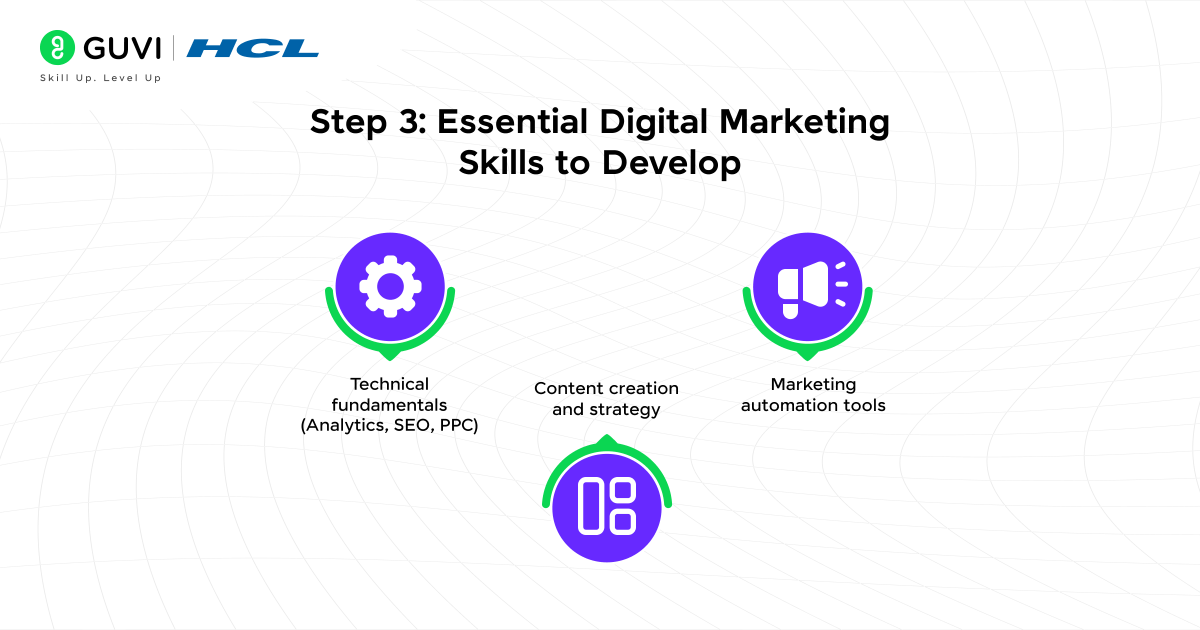
3.1) Technical fundamentals (Analytics, SEO, PPC)
Analytics forms the foundation of your digital marketing journey. Data interpretation skills help you make smart decisions about your campaigns. The core analytical skills you need are:
- Data interpretation and reporting
- Traffic analysis and conversion tracking
- Customer behavior analysis
- ROI measurement
SEO has grown more vital, particularly with the rise of AI technologies like Google’s Search Generative Experience. You don’t need to master the technical backend, but understanding SEO best practices and content optimization will drive campaign success.
3.2) Content creation and strategy
Content drives digital marketing, and your sales experience in communication gives you an edge. Creating high-quality, SEO-friendly content for multiple channels will be part of your role. This has:
- Website content and blogs
- Social media posts
- Email campaigns
- Video content
- Whitepapers and e-books
3.3) Marketing automation tools
Marketing automation tools simplify and optimize the way businesses interact with their audiences, enabling personalized, data-driven strategies to increase engagement and ROI. Below are some of the most widely used tools, along their key features:
1. MailChimp
A widely used email marketing platform designed for small to medium-sized businesses. Known for its user-friendly interface, MailChimp helps automate campaigns and analyze customer data effectively.
Features:
- Pre-built templates and drag-and-drop email editor.
- Advanced segmentation for targeted communication.
- Analytics dashboard for tracking open rates, clicks, and conversions.
- Integration with e-commerce platforms for personalized product recommendations.
2. Marketo Engage (Adobe)
A comprehensive marketing automation platform ideal for enterprise-level businesses. It provides advanced tools for lead nurturing and account-based marketing.
Features:
- Multi-channel marketing support (email, social, web).
- AI-driven personalization to enhance user experiences.
- Advanced analytics to track ROI and campaign performance.
- Seamless integration with CRM systems for better lead management.
3. HubSpot Marketing Hub
An all-in-one inbound marketing platform offering tools for content management, lead generation, and email automation. HubSpot is popular among small and large enterprises alike.
Features:
- CRM integration for complete customer journey tracking.
- Marketing workflows for lead nurturing and segmentation.
- Built-in A/B testing for campaign optimization.
- Analytics dashboard to measure campaign ROI.
4. ActiveCampaign
An advanced customer experience automation tool combining email marketing with CRM and predictive analytics.
Features:
- Conditional workflows for creating personalized customer journeys.
- Predictive analytics for identifying potential customer behaviors.
- Integration with hundreds of third-party tools.
- Real-time reporting for campaign performance.
Step 4) Building Your Digital Marketing Foundation
A well-laid-out approach to learning and certification builds a strong foundation in digital marketing. Digital marketing now makes up 56% of total marketing budgets. The right education is vital to transition your career successfully.
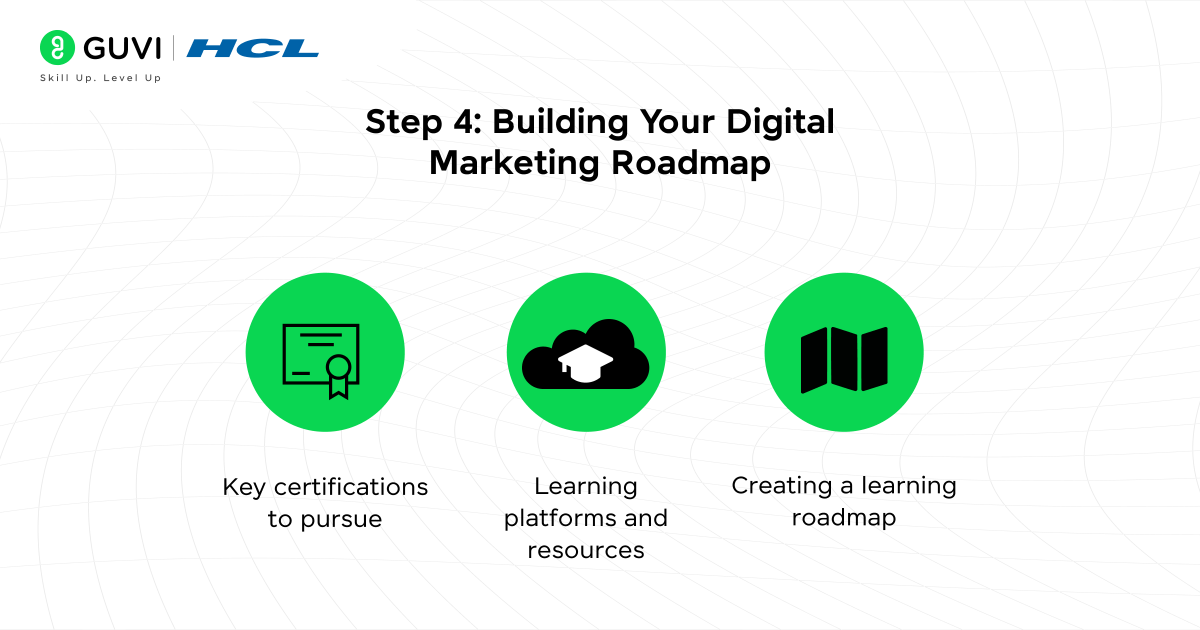
4.1) Key certifications to pursue
Getting the right certifications can substantially increase your earning potential. Certified digital marketing professionals earn an average of ₹8–12 LPA. These certifications will help you get started:
- Google Digital Marketing & E-commerce Certificate
- Meta Blueprint Certification
- HubSpot Content Marketing Certification
- Google Analytics Individual Qualification
These credentials help graduates land positions at leading companies like Google, Meta, Amazon, and Disney.
4.2) Learning platforms and resources
The best learning trip combines structured courses with hands-on practice. Several platforms offer detailed digital marketing education:
- GUVI: Offers a comprehensive Digital Marketing Course that combines practical, job-ready skills like SEO, PPC, and analytics with hands-on projects tailored for beginners, helping you master marketing strategies in just a few months.
- LinkedIn Learning: Provides business-focused digital marketing training
- Google Digital Garage: Offers foundational marketing courses
You can learn at your own pace on these platforms while developing practical skills in content creation, SEO, website optimization, and analytics.
4.3) Creating a learning roadmap
A systematic approach helps you master digital marketing education effectively. Here’s a strategic path to follow:
- Assessment Phase: Evaluate your current knowledge and identify gaps
- Core Competencies: List the essential skills needed for your target role
- Resource Allocation: Plan your available time and budget for training
- Implementation: Start with foundational courses before specialized topics
- Continuous Learning: Keep up with industry changes through ongoing education
Practical application works best with theoretical knowledge. Many businesses support employee growth by sponsoring digital marketing certifications. You should explore this option with your current employer.
Your learning plan should adapt to industry changes while building on your sales experience. Master one area before moving to the next. Learning everything at once can overwhelm you.
Step 5) Leveraging Your Sales Experience
Your sales background is a powerful asset in the digital world. Studies show that salespeople who move into marketing roles excel at understanding customer needs and boosting conversions.
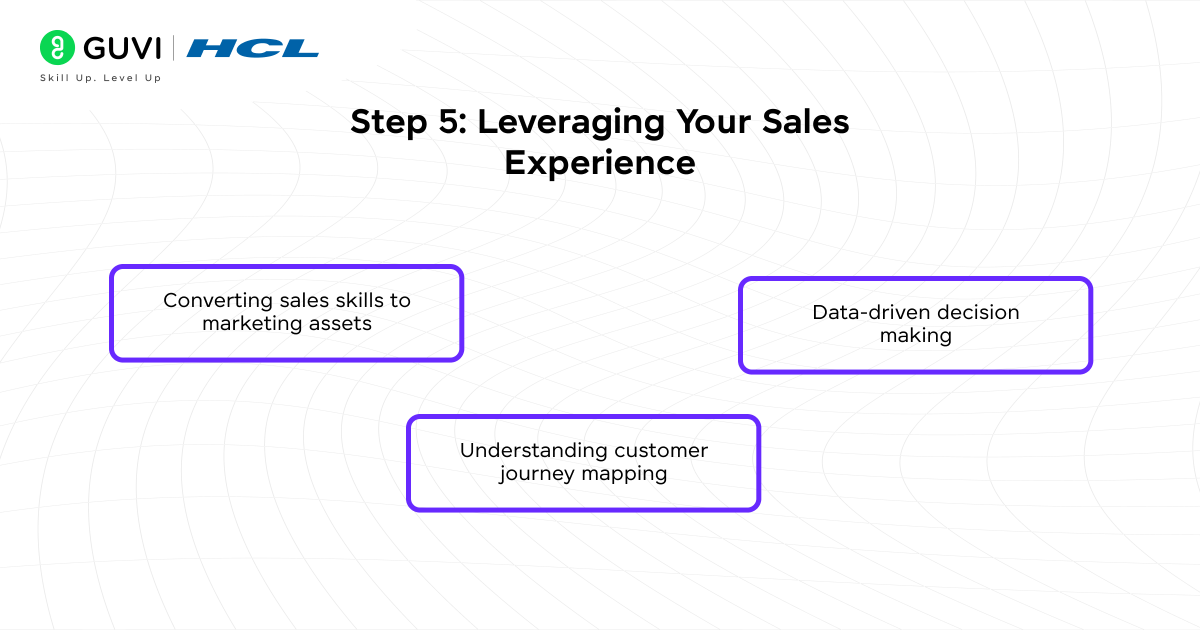
5.1) Converting sales skills to marketing assets
Your existing sales toolkit has valuable skills that directly lead to marketing success. These include:
- Customer relationship building
- Strategic communication
- Problem-solving abilities
- Negotiation expertise
- Adaptability in changing markets
Research shows that a salesperson’s communication skills and customer empathy naturally make them excellent marketers. Your experience in building client relationships and maintaining professional networks adds by a lot to marketing growth through referrals and repeat business.
5.2) Understanding customer journey mapping
Your sales experience gives you a unique perspective into the customer’s experience. Modern customers are “digital kangaroos,” hopping between brands and products across devices. Your grasp of customer behavior helps create better marketing strategies.
You’ll map customer experiences across multiple touchpoints in digital marketing, from awareness to advocacy. Your sales background in active listening and customer participation is a great way to get insights, as less than 30% of organizations rate their digital experiences as ‘good’ or ‘very good’.
5.3) Data-driven decision making
Your sales experience with analyzing customer data sets you up perfectly for marketing’s analytical demands. Organizations that use data-driven decision-making are three times more likely to report major improvements in decision-making.To use this advantage, focus on:
- Analytics Integration: Your experience with sales data helps you understand marketing metrics and campaign performance. Studies show that highly data-driven organizations consistently outperform their competitors.
- Strategic Planning: Your sales background in goal-setting and performance tracking matches marketing’s need for measurable outcomes. Marketing teams now rely heavily on data to optimize campaigns and segment audiences.
Note that your sales experience in turning data into actionable insights becomes valuable, especially when you have marketing teams focusing on ROI measurement and performance tracking.
Step 6) Creating Your Transition Strategy
The time has come to create a strategic plan for your career transition after building your digital marketing foundation. A well-laid-out approach will help you move from sales to digital marketing with confidence and purpose.
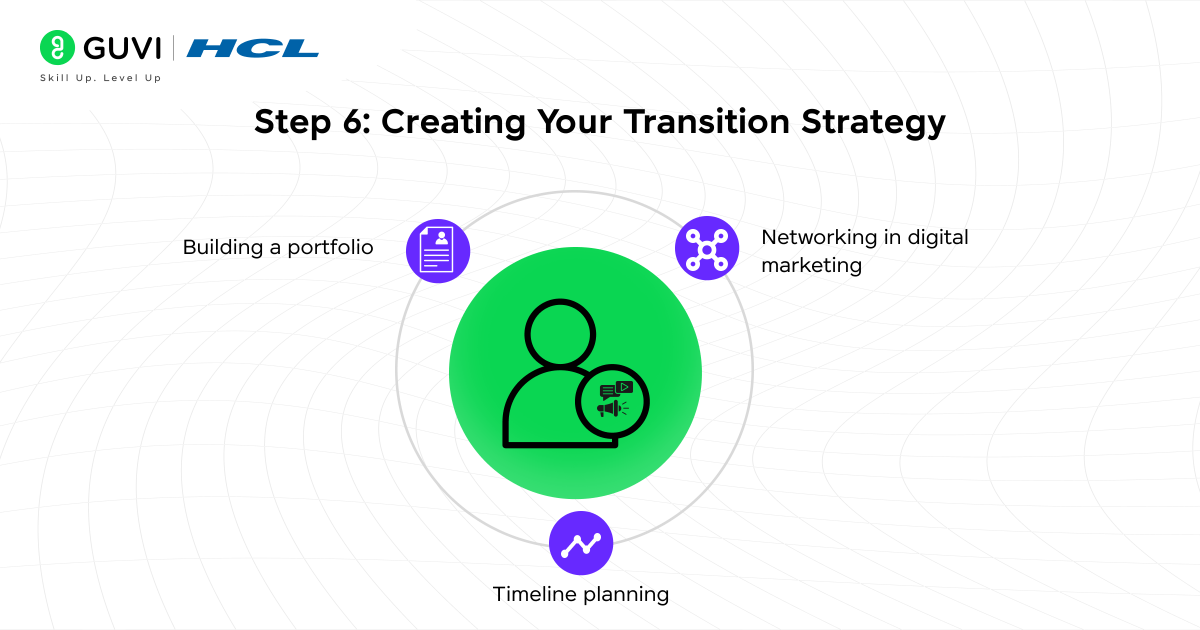
6.1) Timeline planning
Your transition experience needs careful planning to succeed. Professionals who create structured transition plans are 65% more likely to reach their career goals. Here’s your digital marketing roadmap:
- Month 1-2: Complete core certifications and skills
- Month 3-4: Build original portfolio projects
- Month 4-5: Establish industry connections
- Month 5-6: Begin job applications
- Month 6-8: Interview and transition phase
6.2) Building a portfolio
Your digital marketing portfolio proves your capabilities. About 78% of employers give priority to candidates who show practical experience through portfolios. You should create:
- Website Development: Build your own site to showcase your digital marketing experience
- Campaign Examples: Document your marketing strategies and results
- Content Samples: Create blog posts, social media content, and email campaigns
- Analytics Reports: Show your data analysis capabilities
Hiring managers specifically look for data-driven achievements, with 82% placing high importance on measurable results.
6.3) Networking in digital marketing
Professional connections play a vital role in digital marketing. About 80% of professionals see networking as essential for career success. Here’s how to build your network:
- Digital Presence: Your social media profiles need optimization, especially LinkedIn, where 87% of recruiters look for candidates. Share industry insights and involve yourself with industry leaders.
- Industry Events: Marketing conferences and workshops deserve your time. Face-to-face networking creates 40% more job opportunities.
- Professional Associations: Marketing groups and associations open doors. Active members find 3x more career opportunities than passive participants.
- Collaborative Projects: Working with other professionals on marketing initiatives helps. This hands-on experience builds your portfolio and expands your network. Create value-driven partnerships that highlight your expertise in both sales and marketing.
Your existing relationships in sales can lead to opportunities. About 65% of successful career transitions happen through professional referrals.
Concluding Thoughts…
A career switch from sales to digital marketing creates an excellent path with strong growth potential. Your sales experience builds a solid foundation, particularly in understanding customer behavior and analytical decision-making. New technical skills in SEO, content marketing, and analytics combined with your experience will position you well in this ever-changing field.
Professional connections lead to 65% of successful career transitions, which makes building relationships in the digital marketing community vital. Your journey should begin with core certifications. Create a strong portfolio and connect with industry professionals actively.
Digital marketing professionals succeed when they combine customer insight with technical expertise. Your sales background and this detailed guide will help you build a rewarding career in digital marketing.
FAQs
Yes, it’s absolutely possible to transition from sales to digital marketing at any age. Your sales experience provides valuable transferable skills like communication, customer understanding, and persuasion. To make the switch, focus on learning digital marketing fundamentals, gaining certifications, and building a portfolio of projects to showcase your new skills.
Key digital marketing skills to develop include search engine optimization (SEO), content marketing, social media marketing, email marketing, and data analytics. Additionally, familiarize yourself with digital advertising platforms like Google Ads and Facebook Ads. Your sales background will be particularly useful in understanding customer behavior and crafting persuasive marketing messages.
Your sales experience provides valuable insights into customer behavior, relationship building, and persuasion techniques. In digital marketing, you can apply these skills to create more effective marketing campaigns, understand the customer journey, and develop data-driven strategies. Your ability to communicate value propositions will be particularly useful in content creation and copywriting.
To gain practical experience, consider starting a blog or website to practice SEO and content marketing. Volunteer to manage social media for a local business or non-profit. Take on freelance projects through platforms like Upwork or Fiverr. Additionally, look for internships or entry-level positions that allow you to apply your new skills while learning on the job.
The time it takes to transition can vary depending on your learning pace and opportunities, but many people can make the switch within 6-12 months. Start by dedicating 3-4 months to intensive learning and skill development. Then spend another 2-3 months building a portfolio and gaining practical experience. Finally, allow 1-2 months for job searching and interviewing. Remember, continuous learning is key in the ever-evolving field of digital marketing.

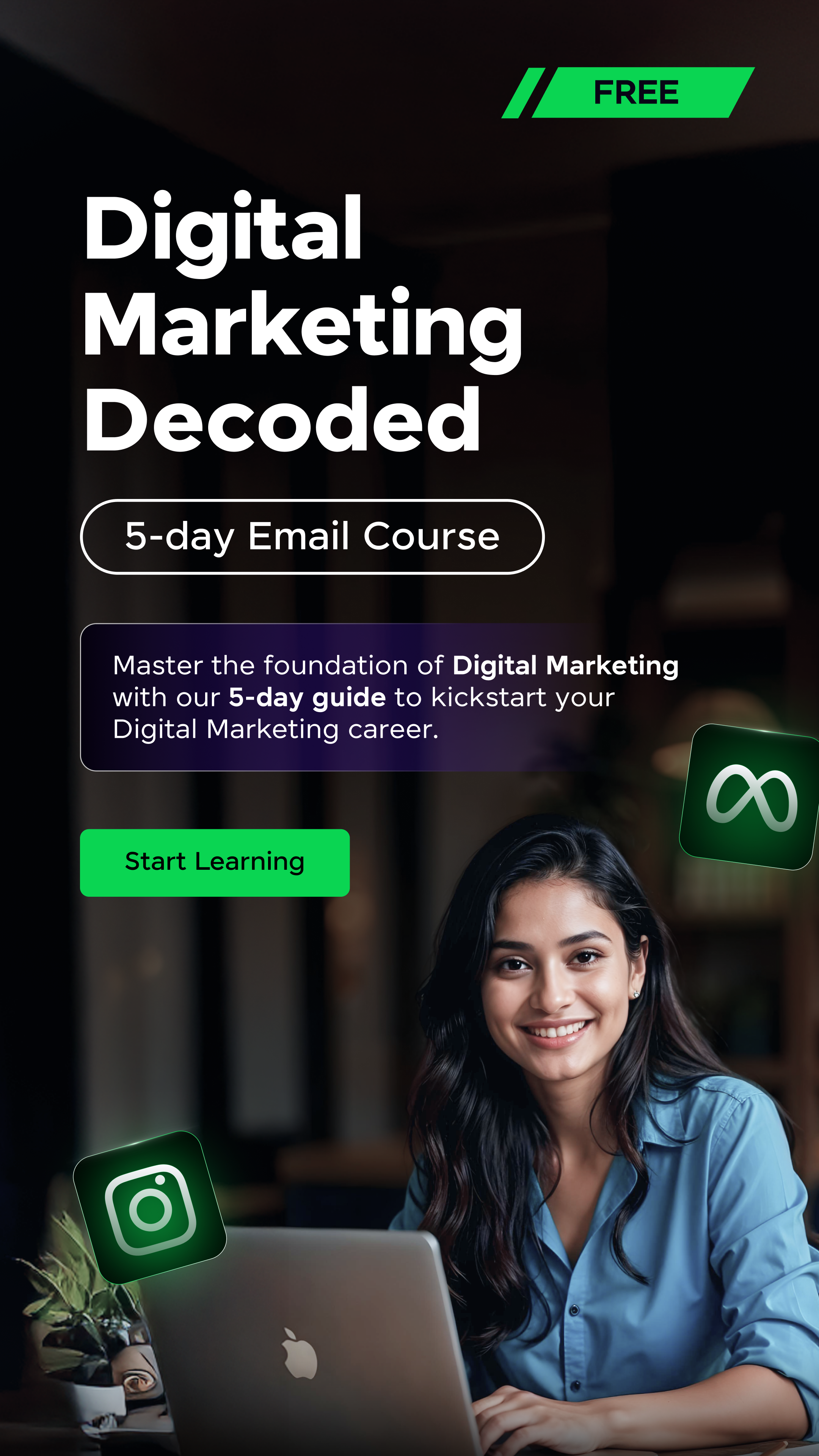




















![Top 10 Mistakes to Avoid in Your Data Science Career [2025] 9 data science](https://www.guvi.in/blog/wp-content/uploads/2023/05/Beginner-mistakes-in-data-science-career.webp)


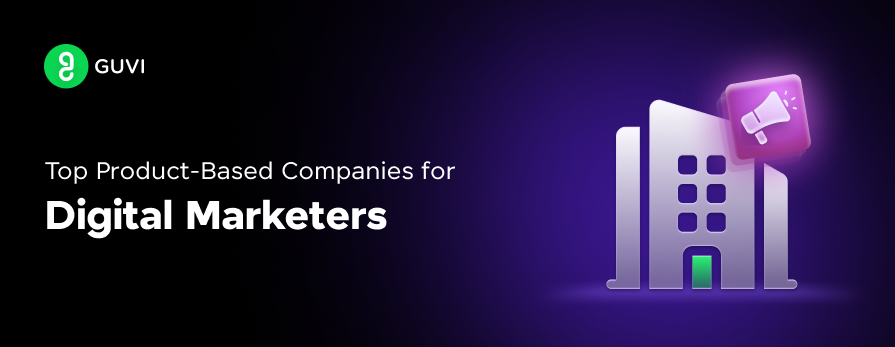
![Top React Interview Questions and Answers! [Updated] 13 React Interview Questions](https://www.guvi.in/blog/wp-content/uploads/2022/01/Top-React-Interview-Questions-and-Answers.webp)
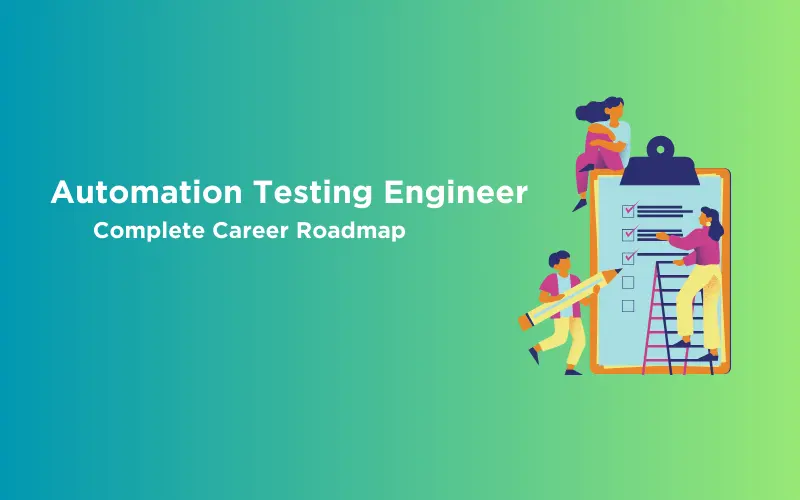
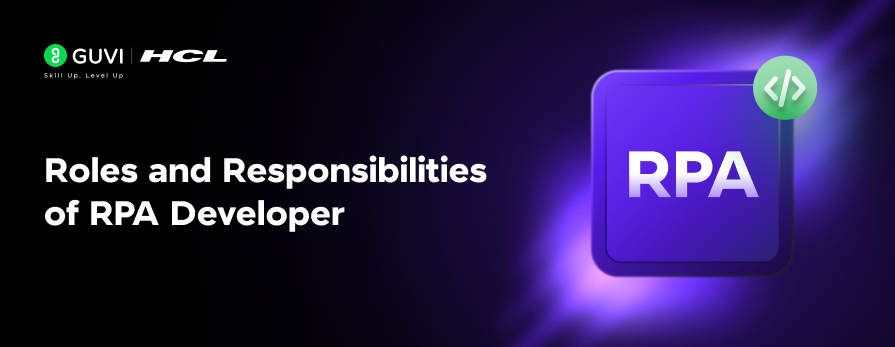
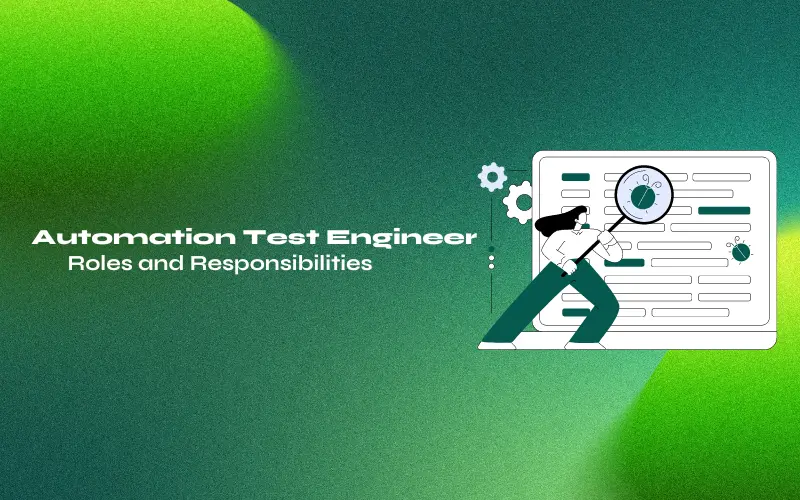

Did you enjoy this article?